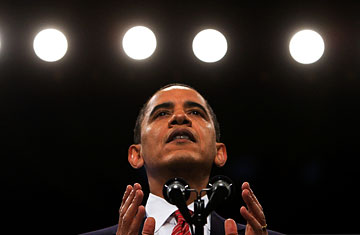
U.S. President Barack Obama speaks to cadets at the U.S. Military Academy in West Point, New York, on Dec. 1, 2009
President Obama's first speech about Afghanistan back in March took place in a government office building on a stage lined with bureaucrats at 9:40 in the morning, when most Americans focus on coffee, not TV. In its wake, polls showed that somewhere between 60% and 70% of the country supported his plan to send more troops to fight a seven-year-old war in a distant desert.
Just nine months later, Obama needed a bigger stage. Only 36% of Americans now think even more troops will improve the American position in this war, according to a recent CBS News poll, including just 17% of Obama's Democratic base. So the President's aides needed to upgrade the setting, interrupt the networks' prime-time lineups and tug a bit harder at the nation's patriotic heartstrings.
The President gave Tuesday night's 34-minute address in front of the coiffed, baby-faced cadets of West Point, America's proud Army leaders in training. In a steady, grim cadence, Obama made the case for putting yet another 30,000 Americans in harm's way. "If I did not think that the security of the United States and the safety of the American people were at stake in Afghanistan, I would gladly order every one of our troops home tomorrow," he said. "This is no idle danger, no hypothetical threat."
His appeal was packaged in emotion. He spoke of visiting wounded warriors at Walter Reed Medical Center, and of signing condolence letters for Americans who have died — 299 so far this year — in Afghanistan. He evoked the wisdom of Presidents Franklin Roosevelt and Dwight Eisenhower, and announced that Americans were "heirs to a noble struggle for freedom," with a "resolve unwavering." But none of it really distracted from the difficulty of the task. Less than a year into his presidency, Obama had to come before the nation to explain that it was losing a war. "The status quo is not sustainable," he said, staring directly into millions of living rooms.
The new Obama strategy for victory has several parts, few of them novel. He will up the troop strength to nearly 100,000, from just 32,000 when he came into office. He will redouble efforts to support the corrupt Afghan government, build up the so-far scattershot Afghan security apparatus, and refocus efforts on establishing a sustainable, non-narcotic agricultural base for the economy. He promised to begin removing troops in July of 2011, but offered no guidance about the pace of withdrawal or an end point for the war. "As President, I refuse to set goals that go beyond our responsibility, our means or our interests," he said, clearly defining none of those terms.
Obama's advisers have taken to calling the latest effort a "troop surge," an ironic term for an Administration that came to power by rejecting President Bush's "surge" of troops into Iraq. But nothing about Afghanistan has gone as expected. In March, his advisers spoke of the new strategy as a break from the past. Obama had then spoken of a "way forward." His speech Tuesday night was titled "The Way Forward in Afghanistan and Pakistan."
Obama's aides say the President recognizes that this is not a repetition that can go on indefinitely, and few in Washington will escape noticing that his July 2011 target to begin withdrawing troops is well-timed for Obama's 2012 re-election campaign. In the meantime, Obama faces pushback from members of his own party, who have been complaining loudly about the wisdom and cost of the decision. "The U.S. government is already spending $3.6 billion a month on the war in Afghanistan," said Representative Louise Slaughter of New York in a statement after the speech. "I see no good reason for us to send another 30,000 or more troops to Afghanistan when we have so many pressing issues — like our economy — to deal with in this country."
Such concerns were not ones that Obama could address easily Tuesday night, though he did acknowledge that wars suck up lots of precious resources and promised to "work closely with Congress to address these costs." For the moment, he is content to do what he has done best — connect with his immediate audience. After the speech ended, he worked the West Point cadets like a campaign rope line, smiling for many a digital camera. The glad-handing won't help in Afghanistan, but it looked good on television, suggesting support from a military that will now be asked to sacrifice some more.
